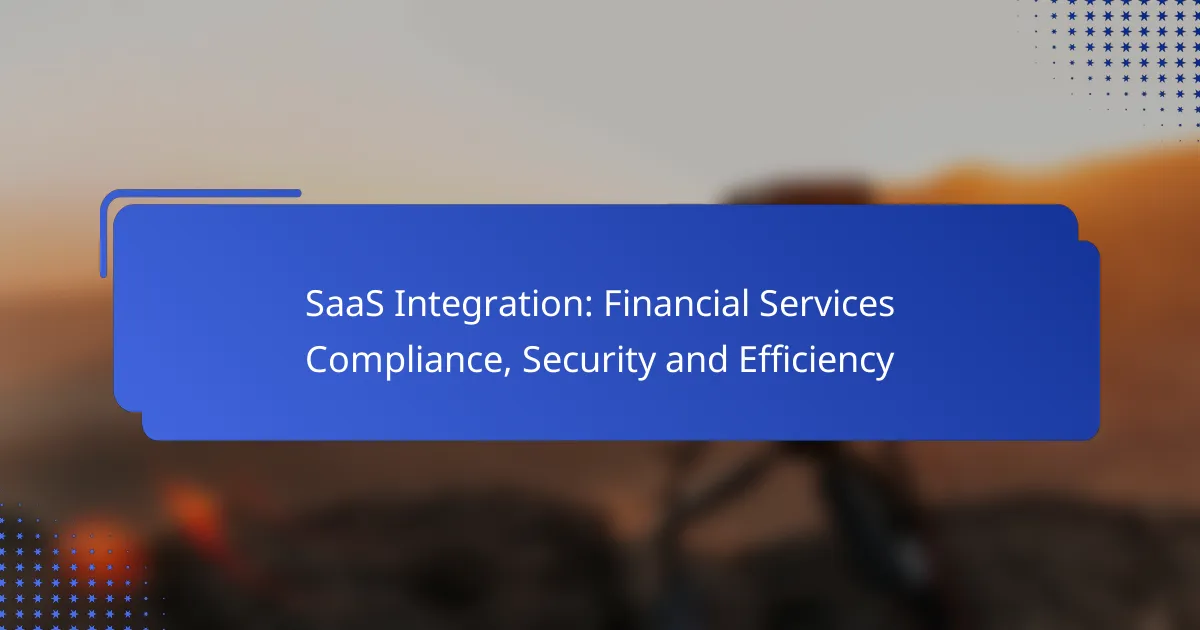SaaS integrations in financial services play a crucial role in ensuring compliance, enhancing security, and improving operational efficiency. By utilizing advanced technologies and automation, these tools help organizations navigate regulatory requirements while safeguarding sensitive data and streamlining processes. As a result, businesses can achieve faster decision-making and reduced risks associated with financial transactions.
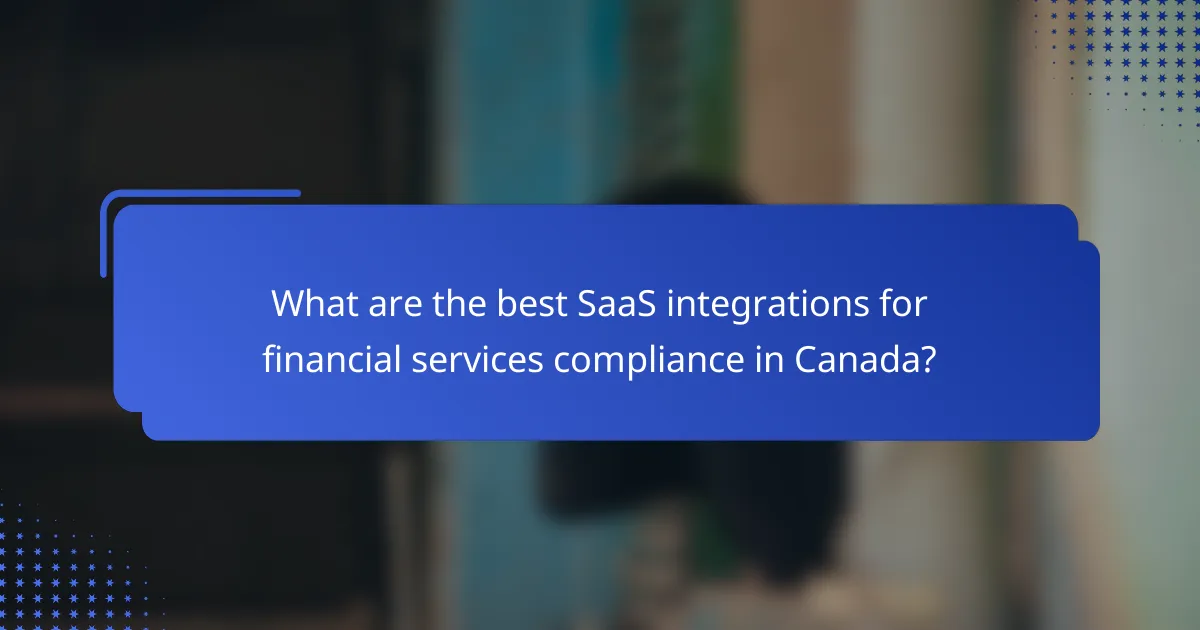
What are the best SaaS integrations for financial services compliance in Canada?
The best SaaS integrations for financial services compliance in Canada include tools that streamline regulatory adherence, enhance security, and improve operational efficiency. These integrations help organizations manage compliance requirements effectively while minimizing risks associated with financial transactions.
Compliance.ai for regulatory updates
Compliance.ai is a powerful tool that automates the tracking of regulatory changes affecting financial services in Canada. It provides real-time updates on new regulations and compliance requirements, allowing organizations to stay informed and adapt quickly.
This platform categorizes regulations by type and jurisdiction, making it easier for compliance teams to focus on relevant updates. Users can set alerts for specific regulations, ensuring they never miss critical changes that could impact their operations.
Riskalyze for risk assessment
Riskalyze specializes in risk assessment and portfolio management, helping financial institutions evaluate their risk exposure effectively. By utilizing a risk alignment framework, it allows firms to quantify risk tolerance and align investment strategies accordingly.
The platform offers tools for scenario analysis, enabling users to visualize potential impacts of market changes on their portfolios. This proactive approach helps organizations manage risk more effectively and make informed decisions to protect their assets.
ComplyAdvantage for AML compliance
ComplyAdvantage is designed to assist financial services in meeting Anti-Money Laundering (AML) compliance requirements. It provides real-time screening against global watchlists, helping organizations identify and mitigate risks associated with money laundering activities.
With advanced machine learning algorithms, ComplyAdvantage continuously updates its database, ensuring that users have access to the latest information. This integration not only streamlines compliance processes but also enhances overall security by reducing the likelihood of financial crime.
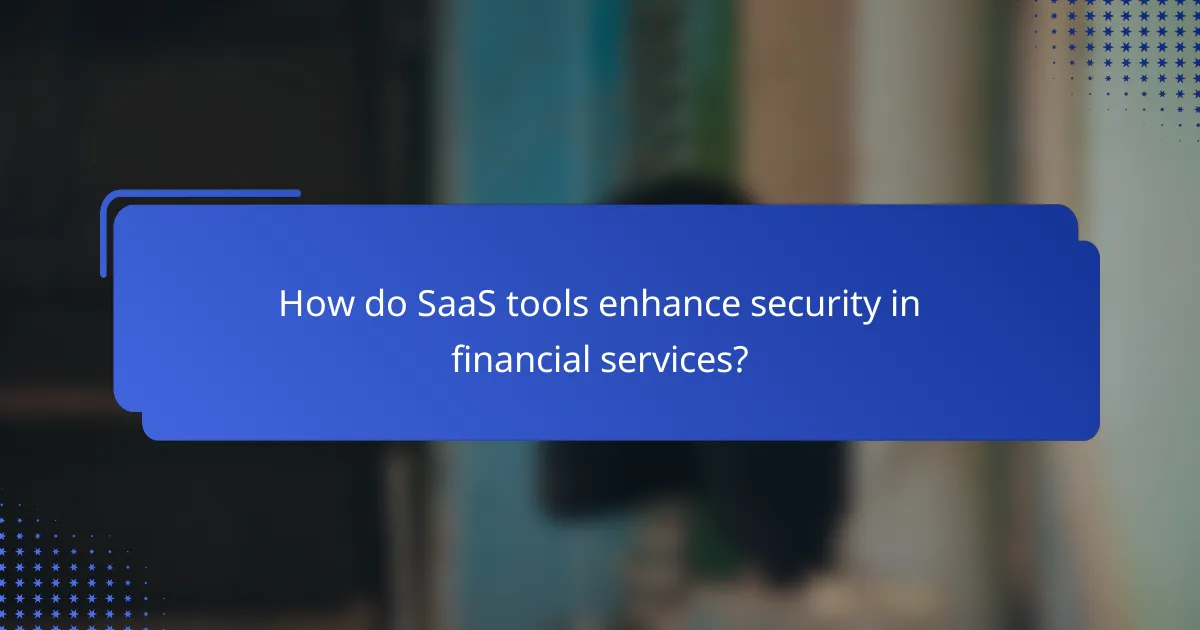
How do SaaS tools enhance security in financial services?
SaaS tools enhance security in financial services by implementing advanced technologies that protect sensitive data and ensure compliance with regulations. These tools often include features like encryption, multi-factor authentication, and regular security updates, which collectively help mitigate risks associated with data breaches and unauthorized access.
Encryption features in Salesforce
Salesforce employs robust encryption features to safeguard customer data both at rest and in transit. This means that sensitive information, such as financial records, is encoded and can only be accessed by authorized users with the correct decryption keys.
Additionally, Salesforce complies with industry standards like AES-256 encryption, which is widely recognized for its security strength. Organizations should ensure that they configure encryption settings properly to maximize protection and meet compliance requirements.
Multi-factor authentication in QuickBooks
QuickBooks offers multi-factor authentication (MFA) as a critical security measure to protect user accounts from unauthorized access. MFA requires users to provide two or more verification factors, such as a password and a code sent to their mobile device, making it significantly harder for hackers to gain access.
To implement MFA in QuickBooks, users should enable this feature in their account settings and encourage all team members to do the same. Regularly reviewing access logs can also help identify any suspicious activity and enhance overall security.
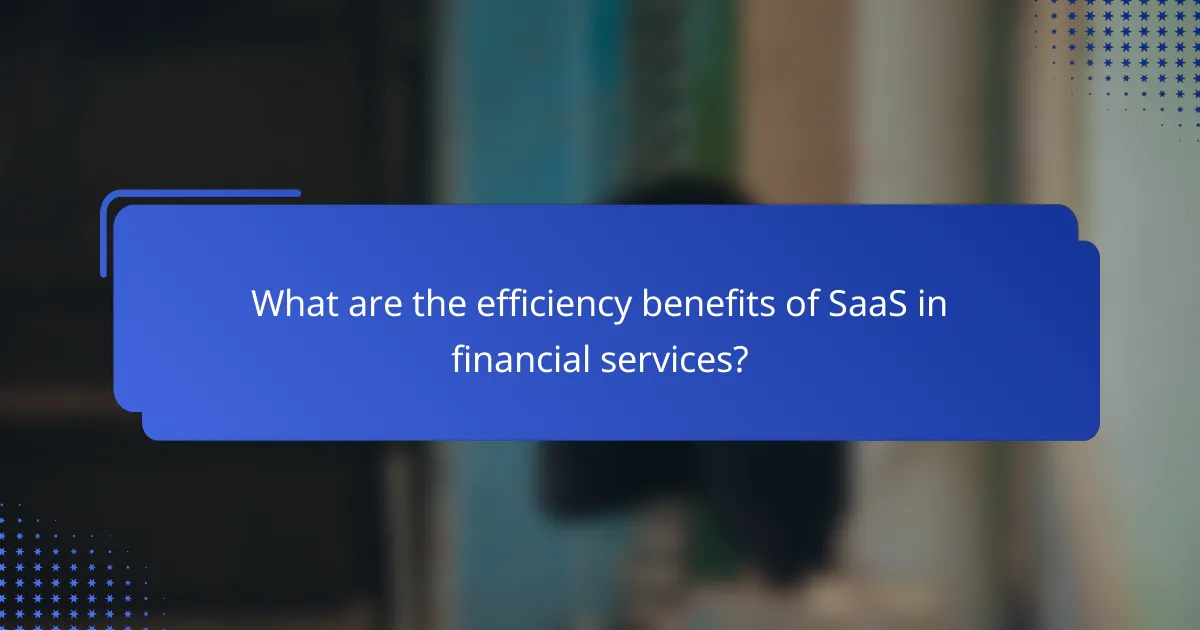
What are the efficiency benefits of SaaS in financial services?
SaaS solutions enhance efficiency in financial services by automating processes, reducing manual tasks, and improving data accessibility. This leads to faster decision-making and streamlined operations, ultimately saving time and resources.
Automated reporting in Xero
Xero offers automated reporting features that simplify financial tracking and compliance. Users can generate real-time reports with just a few clicks, allowing for better insights into cash flow and profitability.
By utilizing Xero’s customizable reporting templates, businesses can tailor reports to meet specific regulatory requirements, ensuring compliance with local standards. This reduces the risk of errors and saves time spent on manual report preparation.
Streamlined workflows in Zoho Books
Zoho Books provides tools to streamline workflows by automating invoicing, expense tracking, and payment reminders. This automation minimizes the need for manual data entry and reduces the likelihood of human error.
With features like multi-currency support and integration with various payment gateways, Zoho Books enhances operational efficiency for businesses operating in different markets. This allows for quicker transaction processing and improved cash flow management.
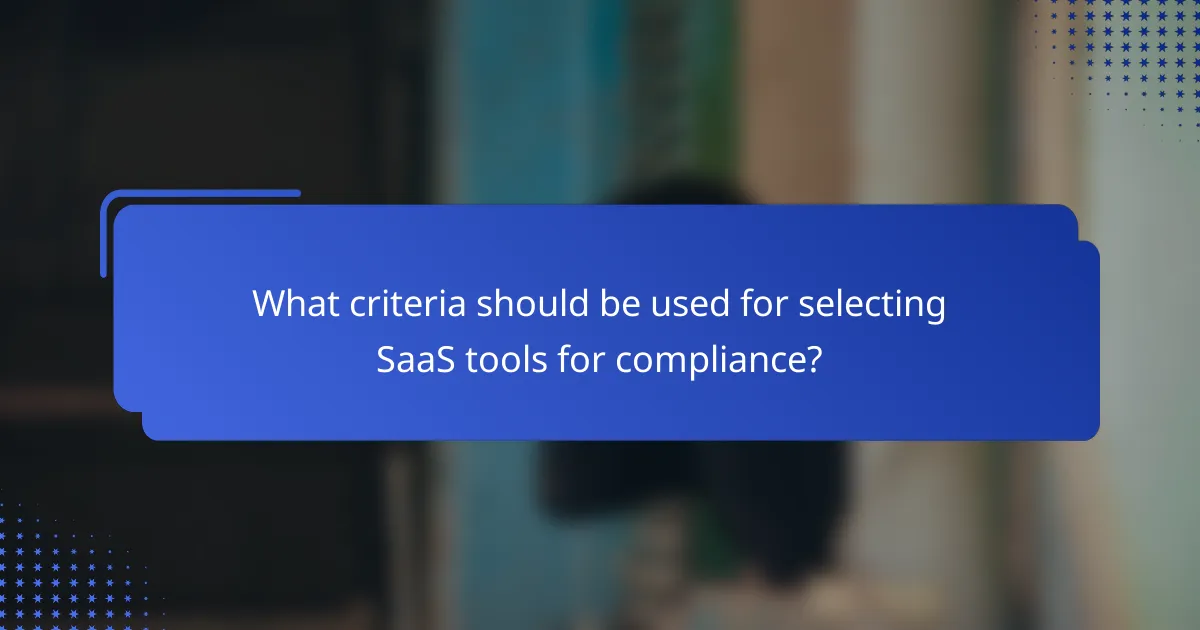
What criteria should be used for selecting SaaS tools for compliance?
When selecting SaaS tools for compliance, prioritize features that ensure regulatory adherence, data security, and integration with existing systems. Look for solutions that not only meet current compliance standards but also adapt to evolving regulations.
Integration capabilities with existing systems
Integration capabilities are crucial for ensuring that new SaaS tools work seamlessly with your current infrastructure. Evaluate whether the tool can connect with existing software, such as CRM systems, accounting platforms, or data storage solutions, using APIs or built-in connectors.
Consider tools that offer pre-built integrations or customizable options to minimize disruption during implementation. A well-integrated system can enhance data flow, reduce manual entry errors, and improve overall efficiency.
Scalability for future growth
Scalability is essential for accommodating future business growth and changes in compliance requirements. Choose SaaS solutions that can easily scale up or down based on your organization’s size and needs without significant additional costs.
Look for features such as flexible pricing models, the ability to add users or functionalities, and support for increased data volume. This ensures that as your business evolves, your compliance tools can adapt without necessitating a complete overhaul.
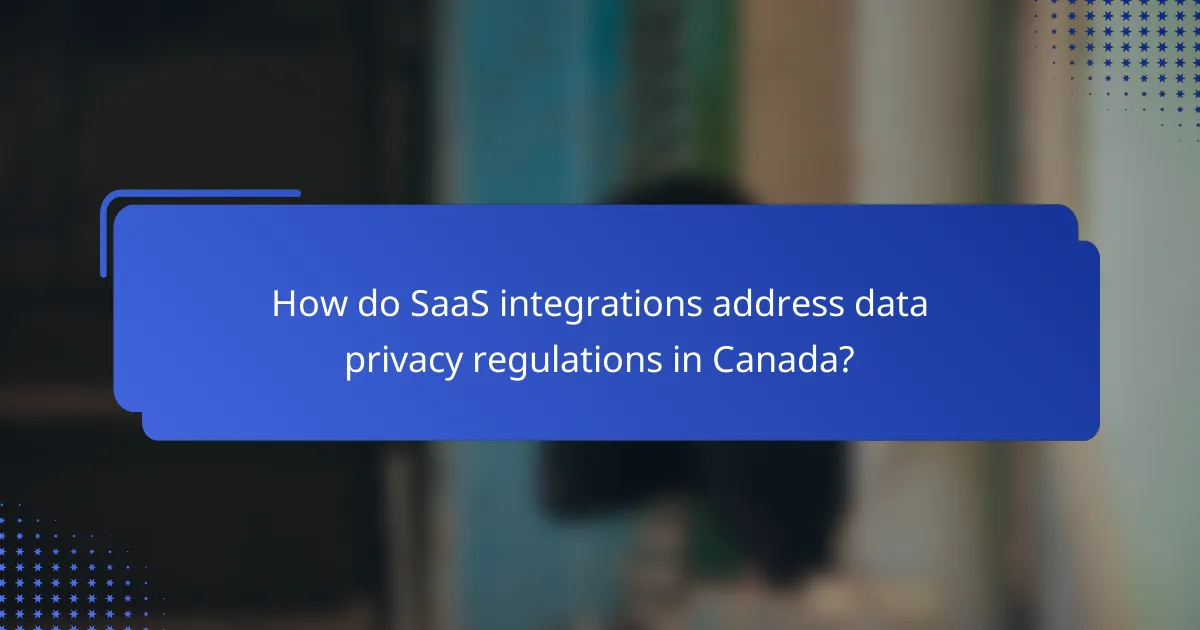
How do SaaS integrations address data privacy regulations in Canada?
SaaS integrations help organizations comply with data privacy regulations in Canada by providing tools and features that ensure data protection and user privacy. These integrations often include built-in compliance mechanisms that align with Canadian laws, such as the Personal Information Protection and Electronic Documents Act (PIPEDA).
GDPR compliance features in HubSpot
HubSpot offers various features to support GDPR compliance, which is essential for businesses operating in or dealing with clients in the European Union. These features include data processing agreements, consent management tools, and the ability to access and delete personal data upon request.
For example, HubSpot allows users to create customizable forms that include consent checkboxes, ensuring that data collection complies with GDPR requirements. Additionally, businesses can easily manage user data and track consent history through the platform’s dashboard.
Data residency options in Microsoft Azure
Microsoft Azure provides flexible data residency options that allow organizations to store data in specific geographic locations, including Canada. This is crucial for compliance with local data privacy regulations, as it helps ensure that sensitive information remains within Canadian borders.
Organizations can choose from various Azure regions in Canada, which helps meet legal requirements while optimizing performance. It’s essential to evaluate the specific residency options and understand the implications for data access and security when selecting a region for storage.
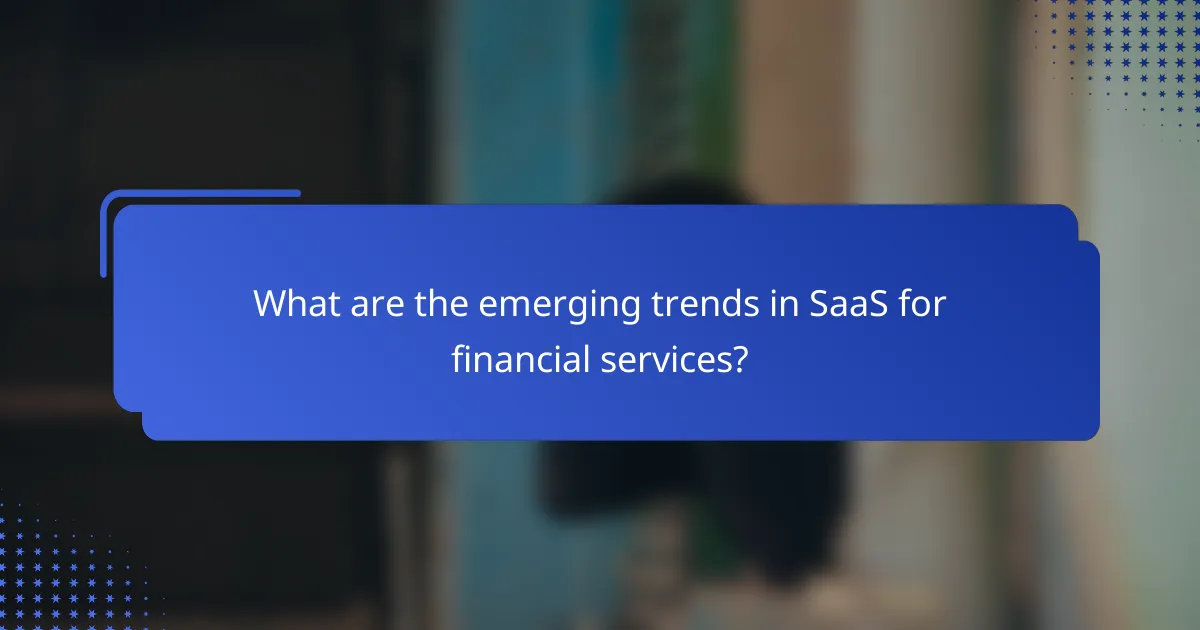
What are the emerging trends in SaaS for financial services?
Emerging trends in SaaS for financial services focus on enhancing compliance, security, and operational efficiency. Key developments include AI-driven compliance monitoring and the use of blockchain technology to secure transactions.
AI-driven compliance monitoring
AI-driven compliance monitoring leverages machine learning algorithms to analyze vast amounts of data for regulatory adherence. This technology can identify anomalies and potential risks in real-time, allowing financial institutions to respond swiftly to compliance issues.
Implementing AI solutions can reduce manual oversight and improve accuracy in monitoring activities. Financial services should consider integrating these tools to streamline compliance processes and minimize the risk of regulatory penalties.
Blockchain for secure transactions
Blockchain technology offers a decentralized and transparent method for conducting secure transactions. By utilizing cryptographic techniques, blockchain ensures that transaction data is immutable and verifiable, which is crucial for maintaining trust in financial services.
Financial institutions can adopt blockchain to enhance security, reduce fraud, and improve transaction speed. However, they should evaluate the costs and technical requirements associated with implementing blockchain solutions to ensure they align with their operational goals.
